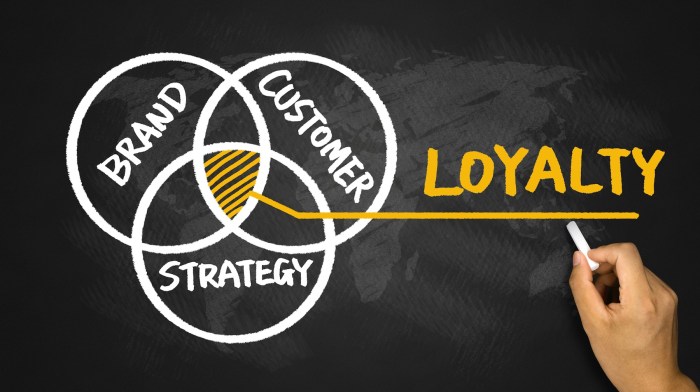Building Brand Loyalty kicks off with a bang, diving into the art of fostering unwavering customer support that stands the test of time. Get ready to explore the ins and outs of brand loyalty like never before.
In a world where competition is fierce and consumer choices abound, establishing a loyal customer base is the key to sustained success for businesses of all sizes.
Importance of Building Brand Loyalty
Building brand loyalty is crucial for businesses as it helps to create a strong customer base that keeps coming back for more. When customers are loyal to a brand, they are more likely to make repeat purchases, recommend the brand to others, and even pay a premium for its products or services.
Examples of Successful Brands with Strong Customer Loyalty
- Apple: Known for its loyal fan base that eagerly anticipates new product releases and upgrades.
- Nike: Has built a strong brand following through innovative marketing campaigns and quality products.
- Starbucks: Customers are loyal to Starbucks for its consistent quality and customer service.
Impact of Brand Loyalty on Long-Term Business Success
- Increased Customer Lifetime Value: Loyal customers tend to spend more over time, increasing the overall revenue for the business.
- Reduced Marketing Costs: Building brand loyalty can lead to word-of-mouth referrals and repeat business, reducing the need for expensive marketing campaigns.
- Competitive Advantage: Brands with strong customer loyalty have a competitive edge in the market and are more resistant to price fluctuations.
Strategies for Building Brand Loyalty
Building brand loyalty is crucial for the long-term success of any business. Here are some effective strategies that companies can use to create and maintain brand loyalty among their customers.
Traditional Methods vs. Modern Digital Strategies
In the past, companies relied on traditional methods such as print advertisements, radio commercials, and direct mail to build brand loyalty. However, in today’s digital age, businesses have a plethora of modern strategies at their disposal. These include social media marketing, influencer partnerships, personalized email campaigns, and customer loyalty programs. While traditional methods can still be effective, digital strategies offer more targeted and interactive ways to engage with customers and build lasting relationships.
Effective Loyalty Programs
One popular loyalty program that has been successful in retaining customers is the Starbucks Rewards program. This program allows customers to earn points for every purchase they make, which can then be redeemed for free drinks and food items. By rewarding customers for their loyalty, Starbucks has been able to create a community of dedicated coffee lovers who keep coming back for more. Another example is Amazon Prime, which offers members exclusive perks such as free two-day shipping, streaming services, and discounts on products. This program has not only increased customer loyalty but also boosted Amazon’s overall sales and profits.
Enhancing Customer Experience

Improving customer experience is crucial for building brand loyalty as happy and satisfied customers are more likely to return and recommend your brand to others. By focusing on delivering exceptional customer service and personalizing interactions, you can create a positive and memorable experience that sets your brand apart from competitors.
Tips for Delivering Exceptional Customer Service
- Train your staff to be knowledgeable, friendly, and empathetic towards customers.
- Respond promptly to customer inquiries and issues, showing that you value their time and concerns.
- Collect feedback from customers regularly and use it to improve your products and services.
- Go above and beyond to exceed customer expectations and surprise them with unexpected gestures of appreciation.
Role of Personalization in Enhancing Customer Experience and Loyalty
Personalization plays a significant role in enhancing customer experience as it shows that you value each customer as an individual. By tailoring your interactions and offerings based on their preferences, purchase history, and behavior, you can create a more meaningful and engaging experience that fosters loyalty. Utilize customer data and technology to personalize communication, recommendations, and promotions to make customers feel special and understood.
Leveraging Social Media for Brand Loyalty

Social media platforms play a crucial role in strengthening brand loyalty by providing a direct channel for brands to engage with their audience in real-time. Through social media, companies can showcase their brand personality, address customer concerns, and create a sense of community among followers.
Utilizing Social Media for Brand Loyalty
- Interact with Customers: Respond to comments, messages, and mentions promptly to show customers that their feedback is valued.
- Create Engaging Content: Develop visually appealing and informative posts that resonate with your target audience.
- Run Contests and Giveaways: Encourage user participation and reward loyal customers with exclusive offers.
Successful Social Media Campaigns for Brand Loyalty
- Starbucks: The Starbucks Rewards program utilizes social media to communicate exclusive deals and promotions to members, fostering brand loyalty.
- Nike: Nike’s #BetterForIt campaign on Instagram encouraged users to share their fitness goals and experiences, creating a sense of community around the brand.
- Dove: Dove’s Real Beauty campaign on Twitter and Facebook empowered women to embrace their natural beauty, resonating with their target audience and building brand loyalty.
Engaging with Customers on Social Media
- Personalized Responses: Address customers by name and tailor responses to their specific inquiries or feedback.
- Show Appreciation: Thank customers for their support and loyalty, making them feel valued and appreciated.
- Solicit Feedback: Encourage customers to share their opinions and suggestions, showing that their input is essential to the brand’s growth.
Measuring and Monitoring Brand Loyalty: Building Brand Loyalty
Brand loyalty is a crucial aspect of any business, and it is essential to measure and monitor it effectively to ensure long-term success. By identifying key metrics, monitoring customer feedback, and using the right tools, businesses can track and analyze brand loyalty to make informed decisions.
Key Metrics for Measuring Brand Loyalty, Building Brand Loyalty
- Customer Retention Rate: This metric measures the percentage of customers who continue to purchase from the brand over a specific period.
- Net Promoter Score (NPS): NPS helps businesses gauge customer loyalty by asking how likely customers are to recommend the brand to others.
- Repeat Purchase Rate: This metric indicates the percentage of customers who make repeat purchases, showcasing their loyalty to the brand.
Importance of Monitoring Customer Feedback and Sentiment
- Customer feedback provides valuable insights into customer satisfaction and areas for improvement, helping businesses enhance their brand loyalty strategies.
- Monitoring sentiment allows businesses to understand how customers feel about the brand, enabling them to address any issues promptly and strengthen loyalty.
Tools and Techniques for Tracking Brand Loyalty
- Social Media Monitoring Tools: Platforms like Hootsuite and Sprout Social help businesses track brand mentions, sentiment, and engagement levels.
- Customer Surveys: Conducting regular surveys can provide direct feedback from customers, helping businesses gauge loyalty and satisfaction levels.
- Data Analytics: Utilizing data analytics tools like Google Analytics can help businesses track customer behavior, preferences, and loyalty metrics.